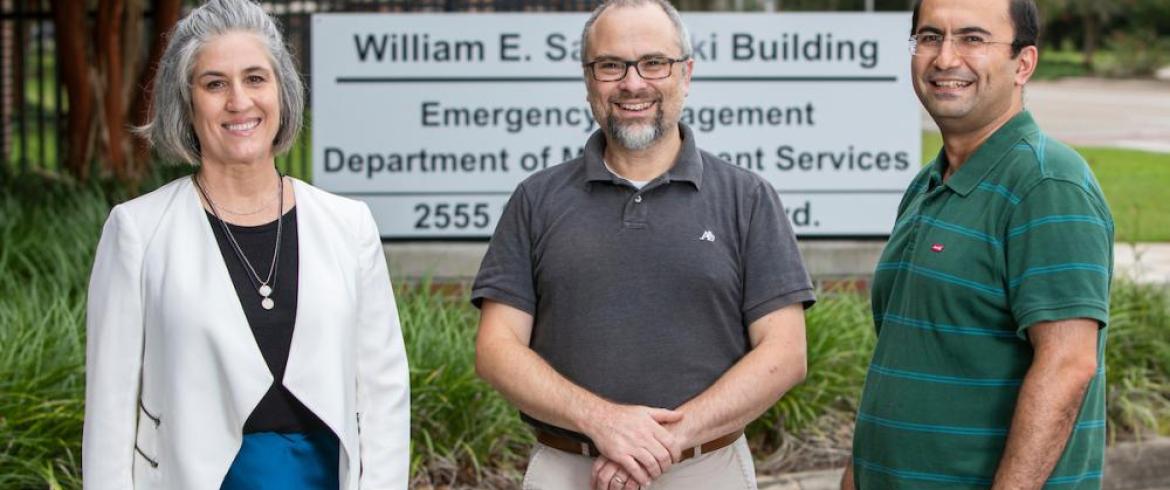
Arda Vanli (center), professor in industrial and manufacturing engineering, leads a team of interdisciplinary researchers including Eren Ozguven, Ph.D. (right) and Ellen Piekalkiewicz looking at how to improve disaster resilience among various populations. (Photo: M Wallheiser/FAMU-FSU Engineering)
Multidisciplinary researchers get National Science Foundation grant for co-occurring pandemic and hurricane shelter study
Every summer, the risk of hurricanes threatens destruction and poses the need for an evacuation from coastal areas in Florida. During the COVID pandemic, evacuation and emergency planners must also consider how to safely meet the sheltering needs of populations without increasing the number of infections. The most vulnerable are especially at risk.
In a new three-year National Science Foundation (NSF)-funded project, researchers at the FAMU-FSU College of Engineering and the Florida State University College of Social Work are working together to use scientific methods to better prepare for hurricane evacuations during a public health emergency.
Arda Vanli is an associate professor in industrial and manufacturing engineering at the college and the principal investigator for the study. The NSF-Excellence in Research HBCU grant awarded the team $542,167 to study the issue.
“We want to develop effective methods to handle hurricane sheltering operations in the midst of a pandemic,” Vanli said. “Our focus is to produce a data-driven framework that integrates hurricane management with a strong understanding of social vulnerabilities.”
Eren Ozguven, an associate professor in the college’s civil and environmental engineering department is co-principal investigator in the study. Ozguven is also the director of the Resilience Infrastructure and Disaster Response Center. RIDER promotes all-embracing and equitable disaster resilience for vulnerable populations.
“The co-concurrence of geophysical hazards with the COVID-19 pandemic has challenged the resilience of our most vulnerable populations,” Ozguven said. “As a result of social distancing requirements, the capacities of regular shelter space may be reduced drastically. We can better serve the needs of populations if we maximize our resources with all-embracing data.”
Data to the rescue
The challenges of natural disasters during a pandemic puts a strain on the resources needed for communities. The framework the researchers want to put in place can help public health and emergency managers allocate resources and minimize disease spread.
“We plan to devise targeted pandemic containment and shelter plans for vulnerable populations,” Vanli said. “Using network-based epidemic models, we hope to understand how sheltering operations affects disease transmissions and how to best assign shelters to minimize infections.”
The research team brings together investigators from engineering and social work who have expertise in statistical learning, infrastructure resilience, disaster risk analysis, community-engaged research and social vulnerability to systematically study the research problems. John Mathias, assistant professor in the FSU College of Social Work and Ellen Piekalkiewicz, the director of the Center for the Study and Promotion of Communities, Families, and Children, are co-collaborators for the study.
“By engaging community stakeholders and surveying social workers, we will make the data relevant to the needs of the most vulnerable populations,” Mathias said.
He explained, “The study combines the strengths of qualitative and quantitative methods to produce plans that address diverse factors in vulnerability and resilience to help stakeholders allocate resources in the aftermath of a hurricane and pandemic.”
More to the story
The researchers plan to take a community-engaged approach and integrate methods from engineering and the social sciences. They are looking at the statistics of how disease spreads to detect emerging outbreaks and more safely utilize hurricane shelters. They plan to integrate epidemic models with hurricane evacuation analysis to predict disease spread.
The team will convene an advisory group of community leaders in disaster management in the government and the nonprofit sector to examine the unique needs of different populations. In working with these community stakeholders, researchers will survey practicing social workers to learn about vulnerability and resilience among the clients they serve.
The NSF EiR-HBCU grant is funded through Florida A&M University, with Florida State University as a partner and supports the multi-disciplinary education and technical training of minority students.
For more information about the grant:
RELATED ARTICLES
Multidisciplinary NSF CIVIC grant to study community resilience to disaster
Engineering Researchers awarded grant to study natural disaster response
